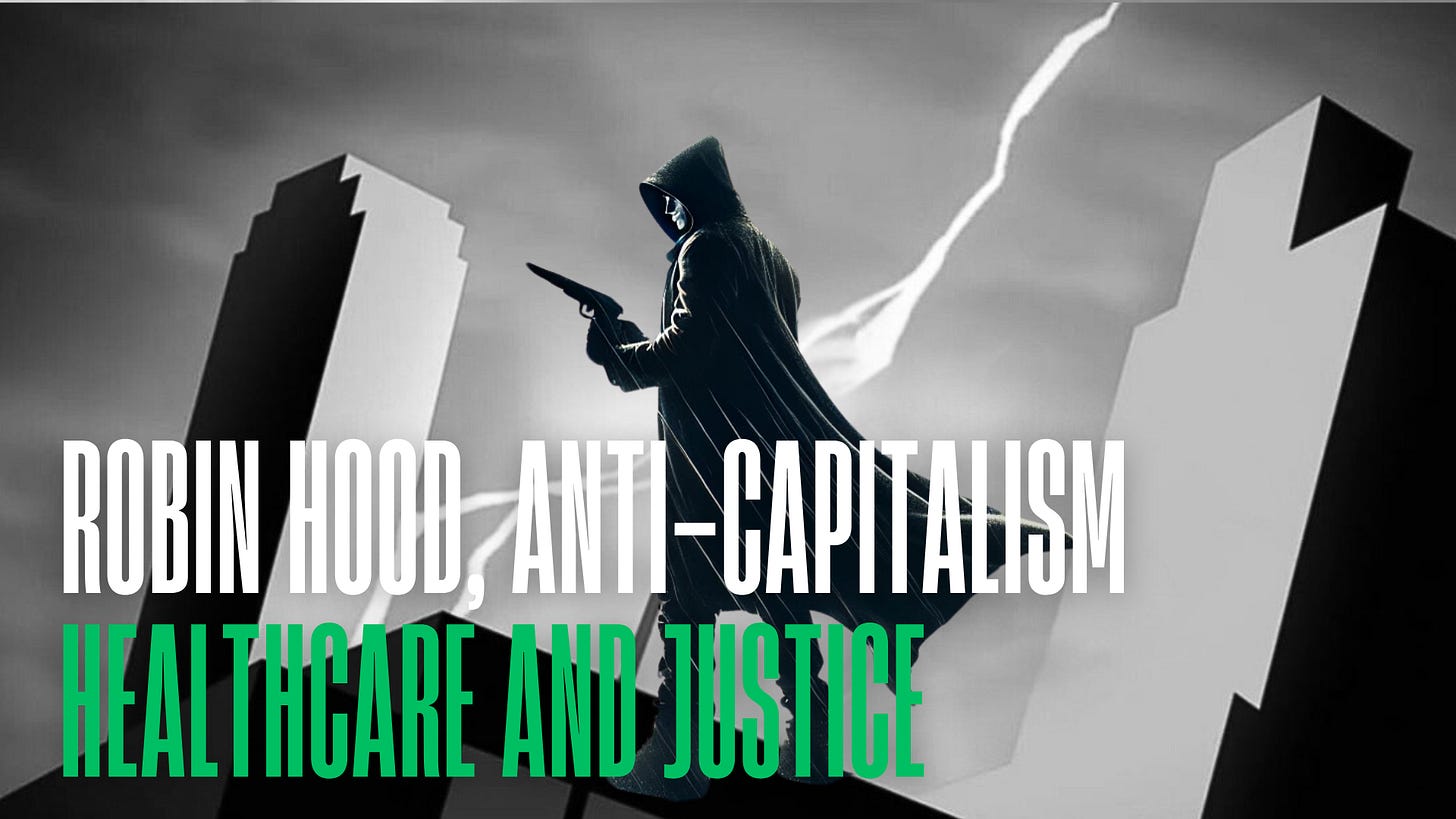Robin Hood: the name conjures an image of a charismatic outlaw stealing from the rich to give to the poor. For centuries, this archetypal figure has symbolized defiance against systemic inequality. From Ned Kelly in Australia to the Great Train Robbers of 1960s Britain, society has repeatedly elevated lawbreakers who challenge entrenched power structures into folk heroes. These figures serve as a collective scream against the perceived injustices of capitalism—whether we agree with their methods or not.
The recent assassination of UnitedHealthcare CEO Brian Thompson, dubbed "The Adjuster" by social media, has sparked a similar conversation in the United States. While the act itself—violent and unequivocally illegal—must be condemned, the outrage it has ignited speaks volumes about the state of healthcare in America. It is a system where profit trumps humanity, leaving even the middle classes vulnerable to financial ruin over medical bills. For many Americans, this act feels like the embodiment of their anger—a symbol of resistance akin to Robin Hood, albeit with bloodier hands.
But why is this Robin Hood figure emerging in modern America? To understand, one must juxtapose this reality with Britain's enduring love affair with the NHS.
As a Brit, I can’t overstate the unique reverence we hold for the NHS. It's not merely a healthcare system; it’s the closest thing we have to a unifying national religion. Free at the point of use, the NHS represents a promise that no matter your income or status, you will receive care. It's an institution that binds us together, transcending class, race, and politics.
When I lived in the U.S., I encountered a staggering cultural divide around healthcare. Dinner party conversations would inevitably turn to co-pays, deductibles, and insurance nightmares. I recall explaining to my American friends how, in the UK, a woman could receive years of cancer treatment—including reconstructive surgery—without paying a penny. Their reactions were often incredulous: “You mean it’s free? All of it?”
Yes, it’s free. Not because healthcare costs nothing but because we, as a society, decided long ago that health is a right, not a privilege. This ethos is alien to many Americans, where healthcare has been commodified to the point of absurdity.
The United States continues to experience escalating healthcare costs, with expenditures reaching $4.5 trillion in 2022, averaging $13,493 per person. This represents a 4.1% increase from the previous year, aligning with pre-pandemic growth rates. However, these rising costs disproportionately affect different segments of the population, exacerbating health inequalities. High out-of-pocket expenses and insurance premiums place a significant financial burden on low-income individuals, often limiting their access to necessary medical services. Additionally, price hikes in prescription drugs, some unsupported by clinical evidence, have added hundreds of millions to national healthcare spending, further widening the gap in healthcare affordability and access.
In the UK, the mere idea of privatising the NHS sparks outrage. It’s political suicide for anyone serious to suggest dismantling or fully privatizing the service. Why? Because we understand, even if only instinctively, that introducing profit motives into healthcare erodes its very purpose. Americans don’t have that safeguard. They have seen healthcare morph into a financial weapon wielded against the most vulnerable—a system where sickness is a revenue stream and delays in treatment can be fatal.
Figures like "The Adjuster" tap into a rich cultural tradition of anti-capitalist resistance. But unlike Robin Hood or the Great Train Robbers, modern corporate systems complicate the moral calculus. Whom do we blame? The CEOs? The shareholders? The system itself? Capitalism thrives on this diffusion of responsibility, creating an opaque web where everyone and no one is culpable.
As Kieran astutely noted in our discussion, capitalism incentivises the worst of human behavior. It is not individuals but the system that is inherently greedy. Even those within it—be they CEOs or pension fund managers—are bound by its rules. This decentralisation of blame makes systemic change feel daunting, if not impossible, leading to acts of desperation like the one in Manhattan.
Mike Donahue asked whether the UK risks falling into the same trap as the U.S. healthcare system. While I’m cautiously optimistic, I share Kieran’s warning: complacency is our greatest enemy. The NHS is not untouchable. Politicians seeking to erode it will likely underfund it first, creating public dissatisfaction and paving the way for privatisation by stealth.
Despite these challenges, the NHS remains dear to the British public. A 2023 British Social Attitudes survey revealed that 24% of respondents expressed satisfaction with the NHS, the lowest level since the survey began in 1983. While this reflects growing frustration with waiting times and underfunding, it also underscores the public’s continued belief in the NHS as a vital institution. Efforts to privatize it outright would be met with fierce resistance.
Britons must remain vigilant. The NHS is more than a service; it’s a statement about who we are as a society. Losing it would mean losing a part of our national soul.
Returning to "The Adjuster," the act was undeniably political, sparking a rare moment of unity across America’s polarized left and right. Both sides are furious at corporate greed, and this shared anger could be harnessed for meaningful reform. But, as Mike cynically pointed out, will it lead to lasting change? Probably not. For all the outrage, America’s political system is too entrenched in corporate interests to allow for radical transformation.
But here’s the thing: revolutions don’t happen overnight. Robin Hood, Ned Kelly, and the Great Train Robbers weren’t just outlaws; they were symbols of systemic failure. They forced societies to reckon with inequality, even if they didn’t offer solutions. Perhaps "The Adjuster" is the same—a mirror reflecting the moral decay of a system that places profit above life.
As Brits, we should cherish what we have in the NHS while fighting to improve it. As global citizens, we must question the systems we live under, asking whether they serve humanity or simply perpetuate inequality. Robin Hood may be a myth, but the ideals he represents—justice, fairness, and resistance to oppression—are as relevant today as ever.
Let’s hope we don’t need more "Adjusters" to remind us of that.












